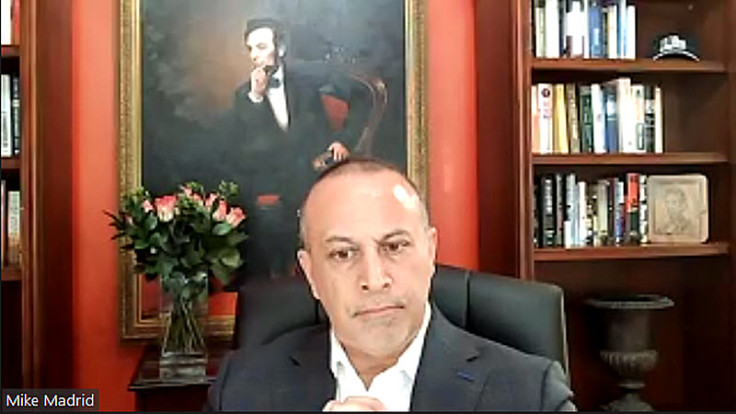
The Latino vote and electorate have been prime focuses ahead of the 2024 elections. With immigration and the economy rising to the top of the list of issues among voters, Hispanics and Latinos across the U.S. are projected to cast the decisive vote on who will occupy the Oval Office for the next four years.
Earlier this year, Trump was projected to win over Biden at the polls. Now, a new survey by The New York Times and Siena College suggests that Democrats have started to unify, bringing the two presumptive candidates in a virtual deadlock, with the former president maintaining a slight edge of 46 percent to 45 percent.
As the U.S. heads towards more polarization, specialists suggest it is productive to look at history to get a sense of voter behaviors and preferences as to predict where they will head this year.
When it comes to the Latino vote, Mike Madrid, a former Republican, is an expert. He has served as the press secretary for the California Assembly Republican leader and as the political director for the California Republican Party.
No longer associated with the GOP— particularly since Trump's election to the White House— Madrid has spent his time reflecting on the Latino population in the United States, particularly how both parties have increasingly failed to capture their support.
The pundit is set to release a book with Simon and Schuster later this year: "The Latino Century: How America's Largest Minority is Transforming Democracy," where he tries to answer the current questions regarding American hyper-partisanship, explosive tribalism and social progress as it relates to the Latino community.
Madrid recently sat down with The Latin Times to discuss the upcoming book and his assessment of the 2024 election and the party's efforts at appealing to the Hispanic audience.
This interview has been edited for length and clarity.
Latin Times: In recent months, numerous reports have surfaced regarding the Latino vote, exploring whether Latinos are leaning towards conservatism, expressing dissatisfaction with Biden, or harboring negative sentiments towards Trump. Can you provide an overview of the current status of the Latino electorate leading up to 2024?
Mike Madrid: That's a great question. It's the right question. As somebody who's been working with Latino voters for three decades now, I think it's fair to say that the state of the Latino vote is very different than it has been at any time in the past 30 years that I've been working on it. We have 4 million new Latino voters from 2020, which is an extraordinary number, and we passed the African American votes in 2020. We're now the largest ethnic group in the country. And I don't think it's hard to say we're not potentially going to be a decisive part of the vote. We just are.
But the actual composition of the electorate is so different now than it ever has been. We're much more US born than we were 20 years ago. Much more. About 80% of all new Latino registrants are US born or are second or third generation English dominant or English exclusive. We're the fastest part of the blue collar workforce. We're starting to vote more like White, non-Hispanic White, blue collar workers. But I wouldn't necessarily suggest that it's a rightward shift.
But I also want to caution, I think it's happening despite Republican efforts, not because of them. I think Latinos are really feeling left out from both major parties. They don't feel that there's a home in either party. And it used to be much easier defaults. When we were more of an immigrant vote, when we were more of a Spanish speaking, recently migrated voter. Now that that's not true. We're seeing this shift towards the Republican Party, or better said away from the Democratic Party. And so our issues are changing. We're becoming a much more economic voter, much more of a class voter than a racial or ethnic voter. And that's the biggest change, and neither party is prepared to address it or handle it.
About 80% of all new Latino registrants are US born or are second or third generation English dominant or English exclusive

LT: In your book, you hint towards a certain unpreparedness from both parties at welcoming and persuading the latino vote. Can you talk a little more about this? Why do you think this is and where do you think this unpreparedness is coming from?
MM: When I wrote the book, I didn't realize how central a question that was going to be in writing. You know, Latinos were the moderates in both parties. You have to start with that understanding that we're not this culturally left, you know, college educated, wealthy community, which is what the Democratic Party is rapidly becoming, it's becoming whiter. It's becoming less diverse. It's becoming more college educated, and it's becoming more progressive. We're none of those things. The Latino voter is a pro-choice voter, a pro-environment voter, a pro-economy voter, a pro-jobs voter, and an anti-tax voter. It's all of these things that really are truly a moderate, middle of the road, voter at a time when non-Hispanic Whites, when White people are basically going to the extremes in both of their parties and engaging in this culture war.
The Latino voter is a pro-choice voter, a pro-environment voter, a pro-economy voter, a pro-jobs voter, and an anti-tax voter. It's all of these things that really are truly a moderate, middle of the road, voter
And both parties, the Democratic party, the Republican Party, are just eyeballs deep in this culture war. And Latinos really, we don't have the luxury of a lot of these fights. We got rent on Friday, we have to get the kids off to school. But we're also much more optimistic. And a lot of that is a function of youth. Younger people are more optimistic, generally. They haven't been hardened by the world as much. But we also have these much weaker partisan histories and partisan anchors. We're less extreme, and it means we have less of an affinity and an attachment to both of the parties, like most White voters, are just so dug in and believe, like their side is virtuous and righteous, and the other side is the enemy and the end of the Republic and the devil.
For the moment, Latinos have this higher trust and confidence in institutions, which are really necessary for continuing democracy. We trust the government, we trust the military, we trust the police, we trust corporations, we trust schools, we trust the media. And it doesn't mean we're naive. It's just that we have a broader sense of community, that you have to believe in institutions if you're going to all live together and work together. And that's just not where White America is right now.
We're less extreme, and it means we have less of an affinity and an attachment to both of the parties, like most White voters, are just so dug in and believe, like their side is virtuous and righteous, and the other side is the enemy and the end of the Republic and the devil.
LT: What do you think is the right way to approach the Latino vote?
MM: Well, let me broadly say this, whichever party is able to capture the hearts and minds of an aspirational, multi-ethnic working class is going to be the dominant party for the next generation. And Democrats have a real problem with the working class piece right now. That's what the Joe Biden problem is. Republicans have historically had a problem with the multi ethnic piece, the diversity piece, because they're appealing more to that kind of White nativist sentiments, anti Latino, anti immigrant rhetoric. But we're seeing more and more Latinos respond to that now, too. So the Republican Party is becoming a more multi ethnic, multiracial party, despite the rhetoric, because our community is increasingly voting along class lines first.
Whichever party is able to capture the hearts and minds of an aspirational, multi-ethnic working class is going to be the dominant party for the next generation
And that's really hard, especially for the American left to understand because, as wealthier White progressives, they have the luxury of thinking about race first. They're not as impacted by the economy as our community is. So it's because they don't have a working class anymore, they're not the party of Franklin Delano Roosevelt. Now, they're the party of college educated, White people. They're not worried about the price of eggs or the price of gas, or they have much, much higher homeownership rates because they can afford housing and they've got much higher rates of college education attainment and all these other economic metrics that then allow them to be kind of horrified by you know, Trump's cultural vulgarity, for good reason, by the way. I'm very anti Trump, but for our communities, you know, we're living in a multigenerational family, and eggs are more expensive, and we probably can't, you know, have our kids join the soccer league this year, because gas is too expensive, and rent may go up again, and we're screwed if we don't pay it and construction jobs are drying up, because interest rates went up so they're not building houses either, and the Democrats want to put us out of business if we work in the energy patch in the Rio Grande Valley, or in New Mexico or the Central Valley of California, like, that's a real threat.
So until the Democrats have a true working class agenda, not just government spending on infrastructure projects, that helps for sure. But you know, building a bridge in 12 years doesn't help. It's literally how they protect and advocate for the blue collar industries that Latinos are the fastest growing part of.
For Republicans one of their greatest hypocrisies is that they say "oh, these Democrats have open borders and they're trying to get new voters coming in." And then in the next breath, they'll be like, yeah, we're winning the Hispanic vote. It's like, well, which is it? I mean, if you're winning the Hispanic vote, you want open borders. They're really conflicted on their own multiethnic diversity piece. It's still deeply ingrained in Republicans' DNA. They'll talk about a big game, but they don't, they don't really mean it.

LT: In your Twitter, you are often talking about shifting narrative between parties, for example, the Democrats have been shifting to a more harsher immigration narrative, whereas Republicans with the abortion issue are all over the place. Do you think these are effective ways to handle such divisive issues? Are they doing this successfully?
MM: That's a brilliant question. Both parties are dealing with shifting coalition's right now and neither of them have found a comfortable place with it. So Republicans are losing White college educated voters, especially women, and they're losing them on cultural issues, and especially abortion. College educated White women are like: 'We've had it. I don't care about the tax cuts anymore. I don't care about my country club membership. Like y'all are too crazy. I'm out.' And so you see what happened in the last 48 hours, as the Arizona Supreme Court is like, we're going back to 1864 laws and then Trump is like, 'no, no, we're gonna fix this. I won't sign an abortion ban.' It's like that's what they've always wanted. And now they've got it. They don't know how to deal with it.
For Republicans one of their greatest hypocrisies is that they say "oh, these Democrats have open borders and they're trying to get new voters coming in." And then in the next breath, they'll be like, yeah, we're winning the Hispanic vote.
Biden's now like, 'okay, I'm gonna Executive Order, we're shutting down the border, like completely like, no, no more asylum. Nobody's coming in.' And they're like, 'wait, what, like, this is right of Trump, like, what are we talking about?' But they're quiet and understanding about it, because the elections are too close. And we don't know what this means. But, you know, they've been saying this as racist for the past 15-20 years, and now it's us to what does that mean? And a large part of it because Latino voters are demanding more border security. Right. And so the Democrats are really losing the diversity in their own party. Like I said, Black and Brown people are leaving the party. And there's a problem: Neither of them really understands this because they're worried about their own base, but they're also worried about losing these central pieces to their coalition.
I think it's harder for the Democrats. White progressives cannot conceive that Black and Brown people would ever vote for a Republican. Right? They just can't. They're just not capable of it. They're like, but you're not White. So you should vote this way. And you know, kind of when you listen to us, 'we're the tolerant ones, and we're the ones who care about you. Except we don't build schools, and we won't build housing, and we will do all of these things that disproportionately impact you. But we'll use Latinx, and we won't be racist with our language.' And so, you know, Latinos and Black voters are kind of going like, 'I just can't relate to your country club lifestyle, like it's good for you. It's not like I'm anti-Democrat.' They're not, they're just like, 'I just can't relate to you.'
Latinos are emerging from the bottom up in a new and unique way, so I think a shift has already happened.
LT: Do you have any predictions regarding trends among Latinos ahead of this year's election?
MM: I'm not as privileged with data as I was last election cycle. This will be the first presidential campaign in 30 years that I'm not involved in. but my gut tells me that we're probably not going to see a very significant shift beyond what happened in 2020. With Latino voters, I think Trump probably gets around 35% of the vote. It may go as low as 32% but it'll be in the mid 30s range would be my guess. Could Biden push him down to the high 20s which is the historical range? He could but it's not likely.
A lot of observers, myself included have come to the conclusion that for the moment, the rightward shift already happened. Shifts happen percentage by percentage over time, not just in one election. I don't believe we are witnessing a realignment. What we are witnessing, which is why I wrote the book, is very unique, is that these are all going to be new voters. Latinos are emerging from the bottom up in a new and unique way, so I think a shift has already happened.
© 2024 Latin Times. All rights reserved. Do not reproduce without permission.







